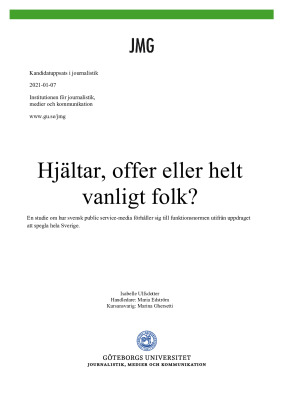Hjältar, offer eller helt vanligt folk?
En studie om hur svensk public service-media förhåller sig till funktionsnormen utifrån uppdraget att spegla hela Sverige.
Aim of thesis: Many studies, including Ljuslinder (2002), have revealed that disabled people
are seriously underrepresented in media. The aim of this study is to examine what strategies
Swedish public service-media use to include disabled people in their reporting. Nine people
with disabilities also share their experiences and views of representation. The public servicecompanies have, as a result of Swedish legislation, an explicit responsibility to include all the
population in their reporting
Theoretical framework: The main theories for this study are some relevant notions used in
the discipline of disability studies. Ableism describes prejudice against disabled people,
exalting the none-disabled body as the dominant norm. Intersectionality is the crossing where
different social categories such as gender, sexual orientation, religion or disability, affects a
person’s life. An individual can never be reduced to only one of these categories.
Methods(s): This study is based on three different methods: an extensive literature study on
what has been written on this subject before, a study of the policies for equality that are used
at the public service-companies (two of three companies agreed to share their policy, the
Swedish radio said no), and finally twelve interviews. The informants are: four disabled
people, five disabled journalists and three representatives for the public service-companies.
The legislation and broadcasting permits for Swedish public service media is also studied.
Results: This study indicates that neither the disabled journalists or the other disabled
informants feel like they are included in the content of public service-media. It seems like the
companies tend to look at disability as something different, not comparative to other
categorizations/discrimination ground such as gender or sexual orientation. Disability issues
needs to be treated the same way to reach success. Another conclusion of this study is that
that the issue of disability and inclusion often is regarded as a question of accessibility only.
Accessibility is important and must not be dismissed, still the issue of full participation is far
more complex.

